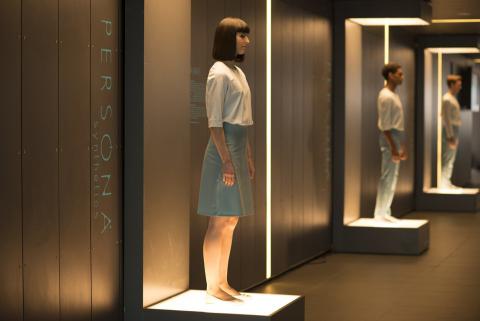Midway through the recent movie Ex Machina, one computer programmer asks another why he invented a machine that can think, talk, and act like a human. “That’s an odd question,” replies the tech visionary played by Oscar Isaac. “Wouldn’t you, if you could?”
Judging from both fiction and the real world, mankind itself finds the question of “why” a silly one when it comes to the notion of artificial intelligence. Whether it’s Tony Stark engineering Ultron as much for world peace as for his own ego, or Apple relentlessly upgrading Siri so as to offer ever-more-precise brunch recommendations, machines seem destined to get smarter—as Isaac’s character says, “the arrival of strong artificial intelligence has been inevitable for decades. The variable was when, not if.”
AMC’s new show Humans underlines the simple fact that most people will get no say in whether the robots arrive, just as it’s always been with socially transformative technology. In its version of the present day, fake humans programmed to take orders from real ones have recently come to act as family maids, elderly caretakers, physical therapists, manual laborers, and prostitutes. Why? “The best reason to make machines more like people is to make people less like machines,” a TV talking head explains towards the end of the pilot. “The woman in China who works 11 hours a day, stitching footballs; the boy in Bangladesh inhaling poison as he breaks up a ship for scrap; the miner in Bolivia risking death every time he goes to work—they can all be part of the past.” The immediately apparent irony is that those words are being taken in by a middle-class English family whose newly bought “synth,” Anita, is cooking dinner in the other room. Dad rifles through the instructional literature that came with it—her?—and lingers on an “Adult Options, 18+” pamphlet.
With its small-bore, domestic focus, Humans has the potential to stand out in the supersaturated genre of A.I. fiction, which tends to consist—just to use the previously mentioned examples from 2015—of ethical ruminations on the soul, as in Ex Machina, or disaster/horror fantasies about being overtaken by our creations, as in Age of Ultron. It’s not that those ingredients aren’t in here: One plotline follows a group of synths who’ve somehow gained true consciousness and are trying to escape captivity, while the Anita narrative is plenty creepy thanks to fears of possibly sinister bot behavior that play on the same maternal anxieties as, say, A Deadly Adoption. What’s different is that as a serialized television show (a co-production with Britain’s Channel 4 and Kudos), Humans can run a greater number of thought experiments, and for longer, than a film or an episode of Twilight Zone or Black Mirror can.
As serialized TV, Humans explore more questions, for longer, than a film or Black Mirror episode.
That mission is helped by the show’s clean, straightforward look, which indeed recalls Black Mirror and other recent trans-Atlantic outings like Orphan Black. Unlike so many hyper-stylized American prestige dramas, it wants to be a sturdy vessel for plot and ideas, not Emmy bait. The result is a cohesive and consistently engaging viewing hour that hopscotches between a variety of story types: chase, horror, comedy. Katherine Parkinson, as a workaholic mom in danger of being replaced at home, and William Hurt, as a retired inventor chafing at his government-owned elderly-care bot, movingly remind viewers of what makes humans human. But it’s the synth-actors’ performances that are the most striking. With lime-green irises and arms that don’t swing as they walk, these droids are both alien and sympathetic, and Gemma Chan as Anita somehow conveys budding consciousness even as she keeps her face entirely blank.
In the two episodes I’ve seen, the main action has largely been driven by deviants: a handful of synths illegally programmed to have souls who therefore don’t want to work as smiling slaves. But perhaps the more interesting narrative threads arise from drone-people behaving exactly as they’re supposed to—obedient and unfeeling. An overachieving teenager starts flunking her classes, reasoning that there’s no reason to excel in a world where machines can perform brain surgery. Anita’s arrival makes Parkinson’s Laura quietly struggle with the question of her role as a mother. And Hurt’s character holds paternal affection for his obsolete, malfunctioning synth, and has to reckon with a literal nanny-state situation due to his age. Disconcertingly plausible and emotionally complicated, these are the kinds of scenarios that civilization will have to ponder before the arrival of the singularity, if there’s chance to ponder anything at all.


Spread the word